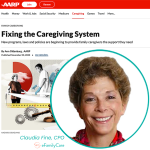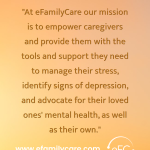
eFamilyCare empowers family caregivers to meet the unique health care challenges for the elderly posed by the coronavirus pandemic. Our TeleHealth resources offer family caregivers the tools to help their vulnerable loved ones avoid unnecessary visits to medical facilities– limiting potential exposure to the virus. Family caregivers, however, must remember that certain in-person visits to clinicians remain essential for maintaining the health and wellbeing of older adults, especially those with multiple chronic care issues. Family caregivers must consider when to encourage their aging loved ones to see their doctor for routine check-ups, screenings, procedures, and emergencies, as avoiding seeking care poses significant health risks. Though the coronavirus remains a public health concern in our country, here are several ways to help ensure the safety of your aging loved one when visits to medical facilities are required:
Call Ahead
Communicating with the healthcare provider beforehand will help ensure that specific safety protocols are being met before your loved one even enters the facility. Some questions to ask when assessing whether the practice is meeting coronavirus safety standards include:
- Is the staff regularly tested for the virus?
- Do they require that patients be tested for COVID-19 before certain procedures or screenings? How is this arranged?
- Will the staff wear personal protective equipment and are all those entering the facility required to do the same?
- How regularly are examination rooms, waiting rooms, and bathrooms disinfected?
Streamlining Check-in
To avoid unnecessary potential exposure to the virus, make sure you and your aging loved one understand the medical facility’s check-in procedures thoroughly. Questions to ask the medical practice before visiting include:
- Is the check-in process digital?
- Can pre-registration be completed online prior to arriving?
- Will the caregiver be allowed to accompany their loved one into the facility?
- Will the office screen for COVID-19 symptoms prior to building entry?
Safe Waiting Room Habits
Understanding your medical facility’s new waiting room procedures helps protect your aging
loved one at all points of the in-person visit. It may be possible to avoid the waiting room altogether and remain outside in a vehicle prior to the appointment. If spending time in the waiting room is unavoidable, following these social distancing guidelines will help ensure your loved one’s safety:
- Keep a distance of at least one chair between your aging loved one and other patients
- Make sure personal protective equipment is being used properly by yourself and your loved one at all times
- Ask if there are separate waiting areas available for non-symptomatic patients
Many medical facilities are actually less busy than usual right now, particularly in areas that are not deemed COVID-19 “hotspots,” so it may be possible to schedule appointments at times when few other patients are present. Ask your office if patient appointments are staggered and how many patients are being seen in the office an hour. Fewer, staggered patient appointments will further limit contact with others and potential exposure to the virus.
In a Healthline article detailing the importance of keeping routine healthcare appointments, Dr. Shoshana J. Herzig, MPH, director of Hospital Medicine Research at Beth Israel Deaconess Medical Center in Massachusetts and an associate professor of medicine at Harvard Medical School in Massachusetts assures people that “health systems across the country have adapted to this pandemic in really remarkable ways.” As medical facilities continuously adjust their office procedures to guarantee the safety of patients, family caregivers can feel reassured in pursuing essential routine care for their aging loved ones. eFamilyFare Care Advisers are available to educate and empower family caregivers to ask the right questions and sort through the best options for their aging loved ones.







